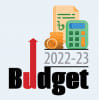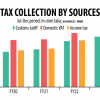Tax measures: Relief for the rich, burden for others

Over the last couple of months, various sections of society called upon the government to raise the tax-free income limit amid the rising cost of living.
Their argument is an upward revision of the ceiling will protect the buying capacity of low-income people to some extent from spiralling inflation and prevent erosion of their living standard.
The demand, as it seems from the proposed tax measures for the next fiscal year, remains unmet with the tax-free income limit staying unchanged for another year.
This means a person with a monthly income of more than Tk 25,000 will have to pay tax even if he or she cannot afford basic commodities to lead a decent life.
The initial tax rate and corresponding slabs of income are to remain unchanged.
But the limit of eligible investment for an individual has been reduced as the National Board of Revenue seeks to cut it to 20 percent from 25 percent of a taxpayer's total income.
It wants to do away with the slabs and introduce a uniform rate of 20 percent for eligible investment and a uniform rate of 15 percent in case of tax credit.
According to NBR officials, there were claims that too many slabs on tax rebates create complexity in tax credit calculation, prompting the tax authority to bring uniformity to the rate of tax rebates.
In the outgoing fiscal year, an individual taxpayer, who earned up to Tk 15 lakh a year, could get 15 percent tax credit on the amount of eligible investment which is 25 percent of the taxpayer's total income. The tax credit rate was the same for an individual earning up to Tk 15 lakh.
In the next fiscal year, the tax credit rate for individuals with annual income of above Tk 15 lakh is going to increase to 15 percent from 10 percent.
Based on the changes, the amount of overall rebate will decline, increasing tax burden mainly on the middle-income taxpayers.
For example, a taxpayer who earned Tk 6 lakh a year was entitled to a tax credit of Tk 22,500 in the outgoing fiscal year.
According to the changes proposed by the NBR, the tax credit will fall to Tk 18,000. This will increase tax burden on the taxpayer, leaving him or her with less money to pay for food, education, healthcare and other necessities after tax payment.
By contrast, if an individual earns Tk 20 lakh annually, the amount of tax credit for the person will go up to Tk 60,000 in the next fiscal year from Tk 50,000 in the outgoing fiscal year, thanks to a 15 percent tax rebate benefit.
The reduction in tax liability of such individuals has surprised many like Snehasish Barua, partner of Snehasish Mahmud & Co, a chartered accountancy firm.
He explained that the advantage of the existing slabs of investment and tax rebate (15 percent tax rebate for income up to Tk 15 lakh) is that it gives higher credit to low-income groups and lower credit to higher income groups.
"The additional tax will be an extra burden [on taxpayers in lower-income slab] given the unabated inflationary trend.
"This is unfair to the middle-income groups, especially for those who earn Tk 10 lakh annually. Moreover, the rebate is reduced … The cost of living is going up. This will lead to a reduction in disposable income of the taxpayers," he noted.
Towfiqul Islam Khan, a senior research fellow at the Centre for Policy Dialogue, said corporate tax has been reduced for both exporters and domestic market-oriented businesses.
"But we see no exemption or waiver for the low-income and middle-income taxpayers. I am surprised… This is a sort of betrayal with them.
"The middle-class people don't get any relief… It seems there is no one to sympathise with them for the ordeals they are going through now," he added.
The CPD had earlier suggested increasing the tax-free income threshold for individuals to Tk 3.50 lakh in view of the added pressure of rising food inflation and the pandemic-induced erosion of income.
The next slab for individual income tax, which is 5 percent for an additional Tk 1 lakh, should be raised to Tk 3 lakh to provide a cushion to the middle-income earners, it said.
The suggestions, however, remain unheeded.
The CPD also said the NBR should reinstate the highest tax rate of 30 percent to promote tax justice.
In fiscal 2020-21, the NBR reduced the rate to 25 percent.
For the next fiscal year, the tax authority has not sought any changes in wealth tax surcharge. This means wealthy taxpayers will not have to pay any increased amount of wealth surcharge as the NBR has kept the ceiling of net wealth and the corresponding rate of tax surcharge unchanged for the second consecutive year.
The tax authority introduced the surcharge in 2011-12 as an alternative to wealth tax to collect more taxes from the affluent section of society.
TAX RULES TIGHTENED
The NBR has tightened tax rules to expand tax net and improve compliance by individuals and businesses in the next fiscal year. For instance, contractors will have to submit proof of submission of income tax return to avoid paying 50 percent higher tax on the payable amount.
During receipt of payment, service providers will also have to pay 50 percent higher tax for failing to show proof of tax return submission.
Snehasish said such a move will push up the cost of business.
Until now, savers in banks and financial institutions have to submit Taxpayers Identification Number (TINs) to avoid paying 15 percent tax on interest income from deposits. In the next fiscal year, they will have to show proof of tax return submission.
To recover unpaid tax, the NBR wants inclusion of a provision in the law to ask utility providers to disconnect gas, electricity and water supply in case of failure to pay undisputed tax.
It also seeks to widen the scope for spot assessment to bring more people under the tax net. Firms will also face higher scrutiny by tax offices that will see whether source tax has been collected properly.

 For all latest news, follow The Daily Star's Google News channel.
For all latest news, follow The Daily Star's Google News channel. 








Comments